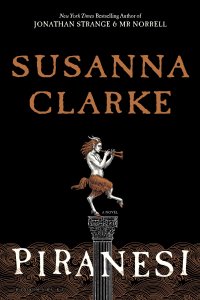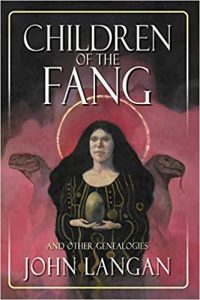Ten for 2020 by Tim Pratt

I was on not one but two award juries in 2020. I told myself it was reasonable because there was a lot of overlap in the potential nominee pools, so it wouldn’t be that much extra reading. I didn’t count on 2020 being a year of unusual strain and psychic deterioration, which increased the difficulty of reading, thinking, making critical judgments, and really doing anything that required executive function. Still, I got through my mountains of books, and even found some comfort (or, at least, distraction) there. I’ll highlight ten of my favorites.
The best book of the year for me was Piranesi by Susanna Clarke. It was my most eagerly awaited book too. Sixteen years after her debut novel Jonathan Strange & Mr Norrel, 14 years after her amazing story collection The Ladies of Grace Adieu – what would she do next? The answer is: something completely different. Piranesi concerns a man with shattered memories who dwells in an impossible house full of flooded rooms and strange statues, his only company a mysterious Other who comes and goes at unpredictable intervals. I closed the book and said, “I wish I’d written that,” which is the highest praise I can give. Piranesi pulls off the impressive trick of being ambitious and sophisticated, while seeming completely effortless. Well worth the wait.
 The most fun book I read was A Deadly Education by Naomi Novik, which I described on Twitter as “What if Hogwarts was a meat grinder”: it’s set at a magical high school, the Scholomance, with a brutal mortality rate, because magic attracts hungry monsters. This book has all the joys of a boarding school novel, with frenemies and jealousy and projects and cafeteria-table politics, but it also has an absolutely enthralling narrator, El. Her natural affinity is for destructive magic on a huge scale, and she can suck out your soul with a glance, but she doesn’t want to be evil, even though being good makes her life so much harder. She gets tangled up with Orion Lake, your classic Golden Boy Chosen One, who should be her natural nemesis… except they click. I haven’t been more excited by the beginning of a series in years.
The most fun book I read was A Deadly Education by Naomi Novik, which I described on Twitter as “What if Hogwarts was a meat grinder”: it’s set at a magical high school, the Scholomance, with a brutal mortality rate, because magic attracts hungry monsters. This book has all the joys of a boarding school novel, with frenemies and jealousy and projects and cafeteria-table politics, but it also has an absolutely enthralling narrator, El. Her natural affinity is for destructive magic on a huge scale, and she can suck out your soul with a glance, but she doesn’t want to be evil, even though being good makes her life so much harder. She gets tangled up with Orion Lake, your classic Golden Boy Chosen One, who should be her natural nemesis… except they click. I haven’t been more excited by the beginning of a series in years.
Alison Stine’s The Road out of Winter is definitely not fun, but it’s very good, a periapocalyptic near-future literary SF novel set in an America where last winter never ended. The protagonist is a pot farmer, so she’s valuable – she can grow things indoors – and her ability adds a small note of hope to an otherwise bleak “road trip through the collapse of civilization” novel. The novel is disturbing and engaging, but since the disaster isn’t even a pandemic, it’s a nice change of pace from reality anyway.
The Lightness by Emily Temple features a smart and self-aware narrator telling the story of a summer spent at a sort of Buddhist summer camp/retreat for troubled teen girls, and the friends she made there. One friend in particular, the charismatic Serena, is obsessed with learning the secret of levitation… no matter what the cost. The novel is jam-packed with quotable lines, chewy philosophy, and complicated relationships that feel real, and the suspense level is high. The speculative element is a little ambiguous but, for me, the magic is real.
The Doors of Eden by Adrian Tchaikovsky wowed me. It’s about alternate Earths that followed different evolutionary paths, where different species rose to sapience. The trilobytes who turn their bodies into spaceships are a particular favorite, though the creatures who upload themselves to a sort of quantum computer made of ice in order to avoid extinction are amazing, too, and who doesn’t love super-spy Neanderthals? There are people trying to stop the worlds from collapsing, and others who want to exploit the multiverse. The cast includes a droll transgender mathematician, an obsessive MI-5 agent, and two cryptid-hunter women who have a star-(and world-)crossed romance. It’s a delight, with a thriller engine hooked up to big science-fictional ideas.
 Little Eyes by Samanta Schweblin takes a much smaller-scale SF idea and tells absolutely wrenching human stories with it. Specifically, it’s about cute little ambulatory robot toys called “kentukis,” capable of making noises but not real speech, with cameras for eyes. You can be a “keeper,” who owns one of the toys, or a “dweller,” who controls it, and sees through its eyes via tablet or computer screen. The connections are totally random, so you never know who’s looking through your toy’s eyes if you’re a keeper, and you never know who you’ll be watching if you’re a dweller – it’s like a mobile Chatroulette platform. The book has lots of characters, some of whom appear only briefly, and others with more complex narratives that unfold gradually throughout the book. Like all my favorite SF, it’s about the impact of technology on human relationships, and in this case, the impact is… mostly bad. The stories Schweblin tells are wrenching and gross and funny and weird and tragic and strange and sad.
Little Eyes by Samanta Schweblin takes a much smaller-scale SF idea and tells absolutely wrenching human stories with it. Specifically, it’s about cute little ambulatory robot toys called “kentukis,” capable of making noises but not real speech, with cameras for eyes. You can be a “keeper,” who owns one of the toys, or a “dweller,” who controls it, and sees through its eyes via tablet or computer screen. The connections are totally random, so you never know who’s looking through your toy’s eyes if you’re a keeper, and you never know who you’ll be watching if you’re a dweller – it’s like a mobile Chatroulette platform. The book has lots of characters, some of whom appear only briefly, and others with more complex narratives that unfold gradually throughout the book. Like all my favorite SF, it’s about the impact of technology on human relationships, and in this case, the impact is… mostly bad. The stories Schweblin tells are wrenching and gross and funny and weird and tragic and strange and sad.
The first time I picked up The Book of Koli by M.R. Carey I bounced off – I found the narrator’s voice distracting and couldn’t sink into the story, so I put it down. People kept telling me how great it was, though, so I tried again later, and for whatever reason, Koli’s idiosyncratic voice charmed me that time instead. I was soon thoroughly immersed in Carey’s bizarre future England, where isolated human outposts use remnants of ancient tech to survive in a world full of deadly vegetation. Koli’s story is tragic, thrilling, and enthralling, and sequel The Trials of Koli is excellent, too.
Stonefish by Scott Jones just kept surprising me. It’s science fiction horror, set in a bleak near future where a struggling journalist is hired to investigate the long-ago disappearance of a weirdo tech mogul. His search leads him to Bigfoot hunters in the Pacific Northwest and eventually to a remote outpost in the wilderness, where things get incredibly strange and disturbing. Stonefish is cosmic horror that actually feels cosmic – it creates the same sort of dizzying disorientation that contemplating the existence of infinity did for me when I was 12 years old. It just keeps unfolding new levels of WTF. I’ve never read a book quite like it, and I’m afraid a lot of people will miss it or misunderstand what it’s really about. (Weirdly, I read two science-fictional Bigfoot books this year: Devolution: A Firsthand Account of the Rainier Sasquatch Massacre by Max Brooks doesn’t make my best-of list, but I enjoyed it a lot.)
I read a lot of horror, and have since I was a kid. By now it’s rare for fiction to actually scare or unsettle me – at most I tend to think, “That was a creepy scene” without actually feeling creeped out. The Only Good Indians by Stephen Graham Jones is an exception: it had me sweating and wide-eyed at three a.m. It’s a story of supernatural retribution stalking four Native American men who committed a transgression against the natural world when they were young. Now, years later, as adults living separate lives, they suffer the (wildly disproportionate) consequences. The characters are believable and compelling, the suspense is unbearable (in a good way!), and the way the supernatural terror infiltrates and escalates is amazing. There are no discernible rules here – no silver bullets, no grimoires with helpful rituals to banish the monsters – just the harrowing and enigmatic logic of nightmares. And yet! The story is not without hope, at least for the generation that comes next.
 Novella Ring Shout by P. Djèlí Clark is badass. Monster hunters (mostly Black women) in the 1920s go to war against “ku kluxes,” interdimensional monsters who feed on hate and possess members of the KKK to further their invasive agenda. Infamous racist propaganda film The Birth of a Nation is a magical spell meant to amplify hate and open the way for something even worse than the ku kluxes. Ring Shout has a pulp fiction engine, but it’s a story with a heart and soul and teeth.
Novella Ring Shout by P. Djèlí Clark is badass. Monster hunters (mostly Black women) in the 1920s go to war against “ku kluxes,” interdimensional monsters who feed on hate and possess members of the KKK to further their invasive agenda. Infamous racist propaganda film The Birth of a Nation is a magical spell meant to amplify hate and open the way for something even worse than the ku kluxes. Ring Shout has a pulp fiction engine, but it’s a story with a heart and soul and teeth.
I said ten, and that’s ten, but it is, after all, 2020, so I’ll briefly mention ten more I also loved: Leave the World Behind by Rumaan Alum, Parakeet by Marie-Helene Bertino, Agency by William Gibson, Lakewood by Megan Giddings, The Light Years by R.W.W. Greene, The City We Became by N.K. Jemisin, collection Children of the Fang by John Langan, The Invisible Life of Addie LaRue by V.E. Schwab, Creatures of Charm and Hunger by Molly Tanzer, and The Human Son by Adrian J. Walker – I could have written a version of this essay where I talked about all those instead.
2020 was terrible horrible no good very bad year in many respects, but it sure was a good one for SF, fantasy, and horror fiction.
In addition to being a senior editor and occasional book reviewer at Locus, Tim Pratt is the author of over 20 novels, most recently space opera The Wrong Stars, first in the Axiom series. His short stories have appeared in The Best American Short Stories, The Year’s Best Fantasy, The Mammoth Book of Best New Horror, and other nice places. He’s a Hugo Award winner for short fiction, and has been a finalist for World Fantasy, Sturgeon, Stoker, Mythopoeic, and Nebula Awards, among others. He lives in Berkeley CA with his family. Every month he writes a new story for his Patreon supporters at www.patreon.com/timpratt
This review and more like it in the February 2021 issue of Locus.
 While you are here, please take a moment to support Locus with a one-time or recurring donation. We rely on reader donations to keep the magazine and site going, and would like to keep the site paywall free, but WE NEED YOUR FINANCIAL SUPPORT to continue quality coverage of the science fiction and fantasy field.
While you are here, please take a moment to support Locus with a one-time or recurring donation. We rely on reader donations to keep the magazine and site going, and would like to keep the site paywall free, but WE NEED YOUR FINANCIAL SUPPORT to continue quality coverage of the science fiction and fantasy field.
©Locus Magazine. Copyrighted material may not be republished without permission of LSFF.






